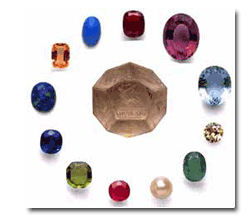
The word gemology is derived from the Latin word "gemma" meaning gem, and the Greek "logos", meaning discourage. Obviously, considering the derivation of the word, gemology could be spelled with one or two m's. In this country it is spelled with one m; in Britain with two.
Gemology is a distinct science. In a sense, it is a branch of mineralogy, but since mineralogy is concerned with many other subjects and does not consider many of the matters taken up in gemology, gemology must be considered a distinct science. It is not only concerned with the study of gem materials and the correct terminology these materials, but also with gemological testing methods, cutting and polishing, synthetically manufactured gems, precious metals and their alloys, and apprising procedures. Moreover, it deals with substances such as pearls, which are not considered in mineralogy. Those who approach the study of gemology lightly are surprised at its breadth. As in any other science, no man ever becomes its complete master.
Reproduction of Gems
Scientific advancement, which has developed the science of gemology, has also made possible the development of synthetic stones, which are not imitations but REPRODUCTIONS, having the same chemical constituents and the same physical and optical properties as the genuine, It requires the trained eye of the expert, assisted by his instruments, to detect the difference. This and the more simple detection of imitation stones are explained in this course. We may expect constantly increasing quantities of such material to appear on the market, making it necessary to test all stones purchased. Thus one more reason for knowing gemstones is to be able to distinguish between the synthetic and the natural, as well as to detect the imitation.

